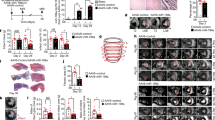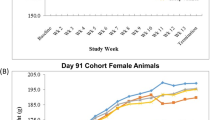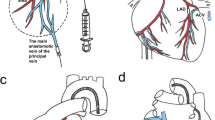Abstract
Several studies have demonstrated the feasibility of gene transfer into the heart muscle. However, all the available data also indicate that the extent of transfection remains limited. As an alternative method to intravascular administration, we have developed a novel strategy which uses the pericardial sac. When a replication-deficient adenovirus containing the cDNA encoding a bacterial β-galactosidase is injected into the pericardial sac of adult Wistar rats the staining is exclusively restricted to the pericardial cell layers. However, injecting a mixture of collagenase and hyaluronidase together with the virus, leads to a large diffusion of the transgene activity, reaching up to 40% of the myo- cardium. Transgene expression is predominant in the left ventricle and the interventricular septum but limited in the right ventricle. In vivo echocardiographic measurements of the left ventricular diameters at end diastolic and end systolic times show no difference between virus- and sham-injected animals, thus indicating a good clinical tolerance to this strategy of virus delivery. The same protocol has been used with the same efficiency in mice, which leads us to propose injection into the pericardial sac as an effective and harmless method for gene transfer into the heart muscle.
This is a preview of subscription content, access via your institution
Access options
Subscribe to this journal
Receive 12 print issues and online access
$259.00 per year
only $21.58 per issue
Buy this article
- Purchase on Springer Link
- Instant access to full article PDF
Prices may be subject to local taxes which are calculated during checkout




Similar content being viewed by others
References
Lin H et al. Expression of recombinant genes in myocardium in vivo after direct injection of DNA Circulation 1990 82: 2217–2221
Stratford-Perricaudet LD, Makeh I, Perricaudet M, Briand P . Widespread long-term gene transfer to mouse skeletal muscles and heart J Clin Invest 1992 90: 626–630
Von Harsdorf R et al. Gene injection into canine myocardium as a useful model for studying gene expression in the heart of large mammals Circ Res 1993 72: 688–695
French B, Mazur W, Geske R, Bolli R . Direct in vivo gene transfer into porcine myocardium using replication-deficient adenoviral vectors Circulation 1994 90: 2414–2424
Lee J et al. Cardiac gene transfer by intracoronary infusion of adenovirus vector-mediated reporter gene in the transplanted mouse heart J Thorac Cardiovasc Surg 1996 111: 246–252
Coffin RS et al. Gene therapy to the heart in vivo and to cardiac myocytes and vascular smooth muscle cells in vitro using herpes virus vectors Gene Therapy 1996 3: 560–566
Kypson AP et al. Ex vivo adenovirus-mediated gene transfer to the adult rat heart J Thorac Cardiovasc Surg 1998 115: 623–630
Magovern CJ et al. Direct in vivo gene transfer to canine myocardium using a replication-deficient adenovirus vector Ann Thorac Surg 1996 62: 425–434
Guzman R et al. Efficient gene transfer into the myocardium by direct injection of adenovirus vectors Circ Res 1993 73: 1202–1207
Barr E et al. Efficient catheter-mediated gene transfer into the heart using replication-defective adenovirus Gene Therapy 1994 1: 51–58
Budker V et al. The efficient expression of intravascularly delivered DNA in rat muscle Gene Therapy 1998 5: 272–276
Donahue JK et al. Ultrarapid, highly efficient viral gene transfer to the heart Proc Natl Acad Sci USA 1997 94: 4664–4668
Wright M et al. β-Galactosidase staining following intracoronary infusion of cationic liposomes in the in vivo rabbit heart is produced by microinfarction rather than effective gene transfer: a cautionary tale Gene Therapy 1998 5: 301–308
Davidson BL et al. A model system for in vivo gene transfer into the central nervous system using an adenoviral vector Nat Genet 1993 3: 219–223
Lamping K et al. Intrapericardial administration of adenovirus for gene transfer Am J Physiol 1997 272: H310–H317
Lim CS et al. Direct in vivo gene transfer into the coronary and peripheral vasculatures of the intact dog Circulation 1991 83: 2007–2011
Muhlhauser J et al. Safety and efficacy of in vivo gene transfer into the porcine heart with replication-deficient, recombinant adenovirus vectors Gene Therapy 1996 3: 145–153
Rothmann T et al. Heart muscle-specific gene expression using replication defective recombinant adenovirus Gene Therapy 1996 3: 919–926
Aoki M et al. Efficient in vivo gene transfer into the heart in the rat myocardial infarction model using the HVJ (haemagglutinating virus of Japan)-liposome method J Mol Cell Cardiol 1997 29: 949–959
Kass-Eisler A et al. Quantitative determination of adenovirus-mediated gene delivery to rat cardiac myocytes in vitro and in vivo Proc Natl Acad Sci USA 1993 90: 11498–11502
Gilgenkrantz H et al. Transient expression of genes transferred in vivo into heart using first-generation adenoviral vectors: role of the immune response Hum Gene Ther 1995 6: 1265–1274
Quinones M et al. Avoidance of immune response prolongs expression of genes delivered to the adult rat myocardium by replication-defective adenovirus Circulation 1996 94: 1394–1401
Lynch CM et al. Adeno-associated virus vectors for vascular gene delivery Circ Res 1997 80: 497–505
Fisher KJ et al. Recombinant adeno-associated virus for muscle directed gene therapy Nature Med 1997 3: 306–312
Acknowledgements
We thank the Vector Core of the University Hospital of Nantes supported by the Association Française contre les Myopathies (AFM) for providing the AdCMVlacZ vector.
Author information
Authors and Affiliations
Rights and permissions
About this article
Cite this article
Fromes, Y., Salmon, A., Wang, X. et al. Gene delivery to the myocardium by intrapericardial injection. Gene Ther 6, 683–688 (1999). https://doi.org/10.1038/sj.gt.3300853
Received:
Accepted:
Published:
Issue Date:
DOI: https://doi.org/10.1038/sj.gt.3300853
Keywords
This article is cited by
-
Cardiac gene therapy: are we there yet?
Gene Therapy (2016)
-
Gene Therapy for Heart Failure: Where Do We Stand?
Current Cardiology Reports (2013)
-
Minimally invasive closed-chest ultrasound-guided substance delivery into the pericardial space in mice
Naunyn-Schmiedeberg's Archives of Pharmacology (2013)
-
Percutaneous Approaches for Efficient Cardiac Gene Delivery
Journal of Cardiovascular Translational Research (2013)
-
Cardiac Gene Therapy: From Concept to Reality
Current Heart Failure Reports (2012)



